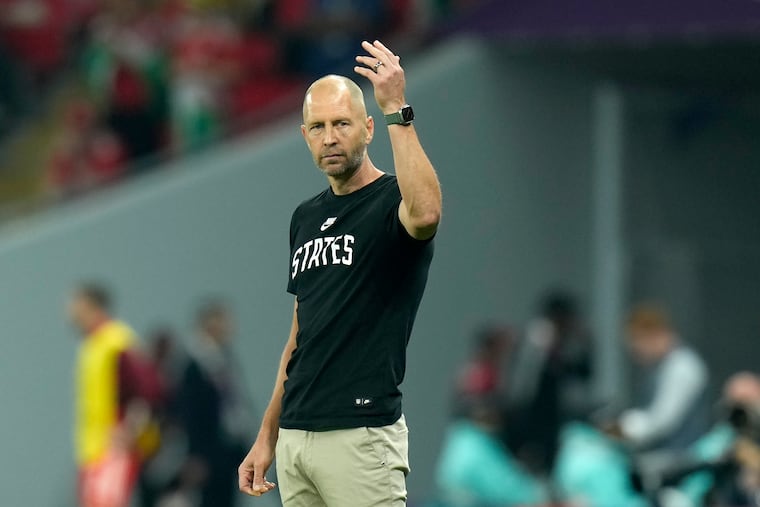The Reyna-Berhalter soccer saga spotlights the potential problem with parents in sports
The soap opera fallout between two longtime soccer friends is just the toxicity that occurs when parents meddle in their child's sport, writ large.

I’m honestly embarrassed for Claudio and Danielle Reyna.
I know the type of parent they are acting like. I’ve encountered enough of them as a soccer player and still find myself around them from time to time as I watch my own son navigate an uber-competitive development track to an academy team.
To quickly get you up to speed, on Tuesday, a monster story of vengeful complaining, and ultimately a friendship lost was unveiled after Claudio and Danielle Reyna, parents of Gio Reyna, a member of the U.S. men’s national soccer team, revealed information about former head coach Gregg Berhalter and the abuse he committed on his now-wife of a quarter century.
Outside a bar while in college 31 years ago, Berhalter and then-girlfriend Rosalind Santana got into a heated argument in which Berhalter ultimately kicked Santana in a reprehensible act of domestic violence. Berhalter and Santana split, but reconciled and got back together seven months following the incident. They later got married and for the last 25 years have shared a union alongside raising their four children.
Claudio Reyna? Berhalter’s best man.
Now, back to Gio Reyna. Reyna, regarded as a key cog in the U.S.’ plans to advance in the FIFA World Cup final, exuded a lackluster effort, one he apologized for publicly and privately to his teammates ― but also one Berhalter, who led the national team as coach, alluded to in describing an incident about nearly sending a player home for as a result. It didn’t take a genius for media types and anyone who follows the national team closely to realize he was talking about Gio.
Gio’s lack of effort led to a lack of playing time in Qatar, much to the chagrin of his parents, specifically Claudio, a former U.S. National Team captain.
So what do the Reynas do to defend their son? Snitch. They admitted they leaked Berhalter’s transgressions from outside that bar 32 years ago to U.S. Soccer officials, according to ESPN. The USSF contracted a firm to conduct an investigation into Berhalter — whose coaching contract expired on Dec. 31. Supposedly, there is a chance he may still be offered a contract, but the investigation must conclude before he or anyone else can be retained.
Now the Reynas attest that their actions were never meant to ensure Berhalter was fired or ruin his future, but what exactly did they expect? What did they really think bringing up a heinous act he committed in college in 1991, one that has now sparked an investigation, would do to him, his family, or his future earnings?
» READ MORE: Claudio and Danielle Reyna admit to disclosing incident to U.S. Soccer concerning Gregg Berhalter
Before you cancel me, here’s the thing. What Berhalter did is inexcusable, and frankly disgusting. But what the Reynas did in defense of their son who didn’t get ample playing time in his first of potentially many FIFA World Cups is arguably, – actually no, not arguably – on the same level.
Let me put it in Philly terms for those still following: The Reynas snitched on their homie because they were mad he didn’t look out for — by all accounts — a pouty kid who made an ultra-competitive roster to represent the United States at the world’s greatest sporting event.
Mind you, we’re talking about a tournament the U.S. men scratched and clawed to finally qualify for after not having done so since 2014.
Come on, bruh.
This is making headlines because it’s such an extraordinary event of parents meddling in their kid’s affairs but as a parent of a young athlete, I see this often. You should hear what parents at my 6-year-old kid’s soccer games say to the referee during games as if the score on some random Saturday morning against two U8 teams will really matter 20 years from now.
About a year ago when my kid was just starting out, I was inadvertently a part of a conversation about the level of coaching on a specific club and how it’s not adequate enough for a child this parent believed was on a fast track to the pros. Also, this mom was incensed that this same coach apparently beneath her 5-year-old’s level of talent would dare raise his voice during games. She even threatened to tell league officials about his behavior.
The league? An inter-county youth travel team for boys aged 6 and younger. The coach? A volunteer dad with a kid of his own on the team.
Sadly, this isn’t unique to soccer. These types of parents exist within AAU basketball and Pop Warner football; they throw fundraisers to buy the uniforms for baseball and softball teams and are the exhausting X factor for coaches of individual sports like gymnastics.
There’s a part of me that knows while these toxic voices might often cheer for your kid, ultimately they only have eyes for their own — for some, at any cost.
And listen, I get it. The time and financial cost to be present at these games is no joke. I know how I would feel if I spent hundreds of dollars to book flights and a hotel for a weekend tournament or showcase only to have my kid receive limited playing time or exposure.
It doesn’t mean I’d go digging up dirt on the coaching staff.
There’s nothing wrong with wanting the best for your child, but to potentially ruin someone else to get it? That’s a level of toxicity, that sadly, across youth sports and apparently even within the professional ranks, I don’t know that I can say with absolute certainty is rare.
In the end, there’s no enemy among friends. Unless that friend holds the key to your child’s future in sports, apparently.